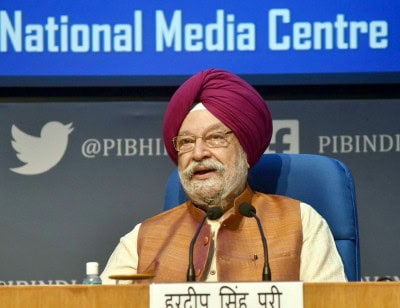New Delhi, Dec 26 : Amid the month-long farmers’ protests on the borders of Delhi against the three farms laws enacted in September, Union Minister Hardeep Singh Puri on Saturday tried to convey the Centre’s intention in favour of the farmers, saying the Modi government took various measures in this direction during the past six years, including six times rise in the budget of the Department of Agriculture and Farmers’ Welfare.
As thousands of agitating farmers are protesting against the three farm laws enacted in the Monsoor Session of the Parliament in September, raising many questions on these reforms, including their impact on the Minimum Support Price (MSP) system, Puri said that Prime Minister Narendra Modi had implemented the recommendations of the Swaminathan Commission to fix the MSP at a level of at least 1.5 times of the cost of production.
Puri highlighted how the amount spent on procurement at MSP went up by 85 per cent in 2014-19 compared to 2009-14– a significant difference noted during Modi government compared to UPA regime.
“MSP has risen in the range of 40-70 per cent for all major crops in 2020-21 in comparison to 2013-14,” he said.
The minister said that procurement of paddy at MSP in Punjab this year has been 25 per cent more than last year and 20 per cent more than even the procurement target for this year.
He informed that over Rs 1,10,000 crore has been transferred directly to the accounts of the farmers through the PM Kisan Yojana and Rs 87,000 crore has been paid as crop insurance against a premium of merely Rs 17,450 crore till date.
Puri said that in 1950, the Indian agriculture sector contributed around 52 per cent to the nation’s gross domestic product (GDP), while employing nearly 70 per cent of the entire population. As of 2019, the sector still employed nearly 42 per cent of the country’s population but contributed only 16 per cent to the GDP, while experiencing a year-on-year growth rate of just 2 per cent, he said.
Referring to a 2018 study by the National Bank for Agriculture and Rural Development, Puri said that 52.5 per cent of all agricultural households were indebted with an average debt of $1,470 (around Rs 1.08 lakh).
The minister added that 30 per cent of the agricultural produce continues to get wasted due to lack of proper cold chain infrastructure. He further said that these factors make up for a quintessentially inefficient supply chain and as a result, the consumers do not have a choice of products, the wastage is high and the prices are highly volatile.
Puri added that at the same time, the Indian farmer is subjected to the vagaries of climate change, markets, middlemen and lack of essential infrastructure.
On the issue raised by the protesting farmers seeking withdrawal of the three farm laws, Puri said that leading agricultural economists have also recommended these reforms which allow the farmers to sell their produce in the open market.
He added that some states have also adopted and implemented these reforms on their own over the years such as Bihar, where the agriculture growth average is 6 per cent compared to the national average of just 2 per cent.
Puri stressed that the government has repeatedly requested the farmers to talk and help resolve of their concerns, adding that the states will be allowed to impose taxes on the mandis and even though the government has developed time-bound dispute resolution mechanisms, it has also agreed to give access to civil courts in case of disputes.
Disclaimer: This story is auto-generated from IANS service.

